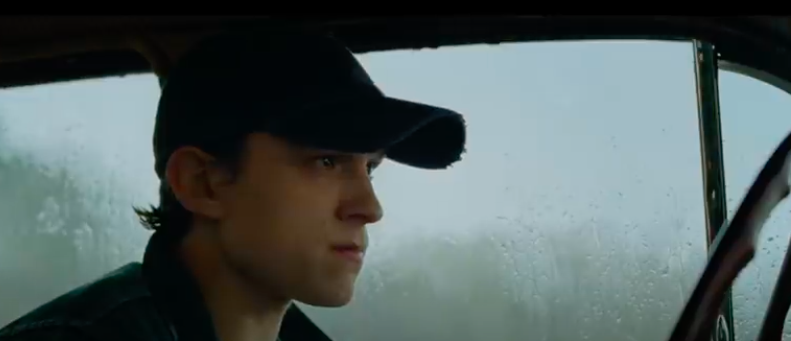Just moments after beating a couple of men to a pulp for making vulgar remarks about his wife, Willard Russell tells his son, Arvin, “There’s a lot of no good sons of bitches out there.”
The story that later unfolds in The Devil All the Time proves this claim. The film, based on the novel of the same name by Donald Ray Pollock, follows a handful of people who reside in either Coal Creek, West Virginia, or Knockemstiff, Ohio, in the 1950s and ‘60s. Despite the roughly 10-hour-long drive between the two towns, there are plenty of curious connections between their residents.
The Devil All the Time is a carefully crafted tale, with minor coincidences that build up into an absolutely baffling turning point. Each main character was given a meticulous backstory, but it wasn’t until the movie’s conclusion that I caught onto the seeds planted by director Antonio Campos throughout the film.
Most of the towns’ inhabitants are fairly God-fearing, but that doesn’t necessarily mean they’re morally pure. The overwhelming themes of religious fanaticism and sacrifice take on multiple forms. We witness it as a hopeless last resort, as Willard (Bill Skarsgård) sacrifices the family dog in the hopes that God will cure his wife’s terminal cancer, and as alarming commitment, as Roy Laferty (Harry Melling) pours a jar of spiders on his head as a testament to God taking away his arachnophobia.
[Review: ‘Enola Holmes’ is the uplifting story we need right now]
I commend the cast for taking on these fanatic levels of piety. From the first words he utters in front of the Coal Creek congregation, Melling demonstrates Roy’s deep commitment to Christ, holding this crazed stare as he speaks about how God gave him strength that’s hard to turn away from.
Within this devout community, we also come to meet Rev. Preston Teagardin, played by Robert Pattinson, in a role unlike any of his previous ones — complete with the twang of a higher-pitched southern accent. The accent felt silly and contrived at first, but as we about the reverend’s predatory ways with underaged girls in the congregation, the tinny accent builds off this phony character of a younger, flashier preacher with something to hide.
Amid these loyal zealots is the 17-year-old Arvin (Tom Holland). It’s safe to say he hasn’t kept up with his faith, especially after his own father committed suicide after the sacrificial family dog didn’t work.
But though he may not have inherited his father’s religious beliefs, Arvin carries Willard’s legacy in other ways. The protagonist definitely held onto Willard’s advice of hitting those “no good sons of bitches” when they least expect it. He put this theory into practice when taking vengeance on the high school boys who relentlessly teased his stepsister. On paper, Arvin’s actions may not be the godliest, but they surely punished those who deserved it.
Like the characters in this film who thought God was “testing” them, I felt like this film was testing me for not being on the Tom Holland bandwagon. As someone who isn’t wrapped up in the Marvel film universe, I finally understand the hype for Holland. He played the vigilante role well, with the earnest defense of his loved ones making up for the fact that he often got too carried away.
[Review: ‘Kajillionaire’ captures a quirky slice of life]
Especially considering how preoccupied the towns were with divine acts of intervention, you could argue God was on Arvin’s side. Each suspenseful shootout he was involved in gripped me with genuine uncertainty about his survival. The fearful seconds of uncertainty after the final shots — where we’re convinced Arvin was shot before he resurfaces as a survivor — never got old. I met each of these dramatic shootouts with an organic sigh.
The tranquil scenery in The Devil All the Time made each moment more unsettling. There was a lingering darkness that forced viewers to remain on edge. And when that darkness reared its ugly head, you were met with a bleak contrast to the breathtaking nature surrounding it all. After killing an outlaw couple in defense, the camera pans to a close-up Arvin — scrambling for more bullets and his next move. A jump-cut then brings us to a zoomed-out shot of the woods, producing mixed emotions of shock from what just happened and awe from the mellow scenery.
The narration woven into the story from the author was another welcomed addition. Although the narrative has that predictable storytelling feel to it, it keeps the interwoven storylines straight. And having the author around maintained the original structure of the novel.
With a runtime of two hours and 18 minutes, I found the film monotonous at first, but the explosive nature of these characters’ storylines coming together made it all worth it. It was an intense surge of clarity — each moving piece from the start mattered in the grand scheme of things.
This clarity is classic. I’m glad The Devil All the Time won me over in the end.



